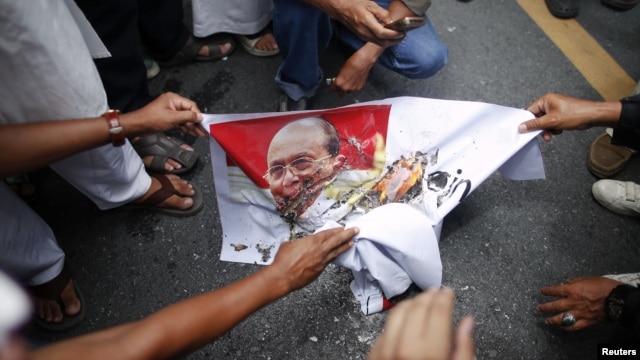
Muslims burn a picture of Burma's president Thein Sein as they protest in front of Burma's embassy in Bangkok, June 21, 2012.
Chinese state media are warning against "excessive and hasty" democratic change in Burma, saying democracy alone cannot solve all of the Southeast Asian country's problems.
A commentary in the Communist Party-run Global Times acknowledged that the recent reforms by Burma's new quasi-civilian government are bringing "unprecedented hope for the nation's prospects."
But it also warned Burma of the dangers of what it called "Western-style democracy," saying too hasty of reform could "provide chances for all kinds of extremists."
In particular, it mentioned the recent conflict between Buddhists and Muslims in western Burma that has left dozens dead and tens of thousands displaced.
The article, entitled "Democracy no panacea for Myanmar's woes," said such conflicts "may get worse and run out of control" if Burma is too heavily influenced by the West or excessively relies on Western models of government.
China has been a long-time ally of Burma's former harsh military leadership, which stepped down last year and ceded power to a nominally civilian government that has since enacted a series of political and economic reforms.
The editorial also used the recent unrest in Egypt as an example of what can happen when a country enacts democratic reforms, saying elections there "may further split the society and even trigger more religious conflict."
It said Burma's ethnic problems cannot be fixed by "the appearance of one or two democracy leaders," in apparent reference to democracy icon Aung San Suu Kyi, who was released from house arrest in 2010 and recently elected to parliament.
The Global Times questioned whether Aung San Suu Kyi and her National League for Democracy could help achieve ethnic reconciliation in Burma, saying the Nobel laureate "didn't seem to have a solution" for the recent violence there.
The paper said a "weak, divided government" is not able to solve complex ethnic problems, which it said were "directly related to the legacy of British colonial rule" in Burma, which ended in 1948. |
|
